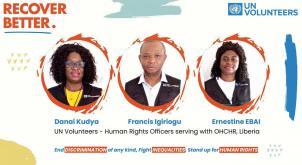Three international UN Volunteers assisted six pregnant students to resume classes and attend the West African Senior Secondary Certificate Examination (WASSCE). These UN Volunteers serve with the UN Office of the High Commissioner for Human Rights (OHCHR), and are assigned to monitor the impact on human rights during the COVID-19 state of emergency in Liberia.
Ashu Orock Ernestine from Cameroon, Danai Kudya from Zimbabwe and Francis Igiriogu from Nigeria serve as UN Volunteer Human Rights Officers with the OHCHR Liberia Country Office to address inequalities resulting from COVID-19 collateral damage.
In June, the volunteers discovered that six pregnant students of a catholic secondary institution in Grand Geddeh County were barred from attending classes and even from taking the WASSCE exams, even though they were already registered.
Danai, Ernestine and Francis, through their skills as highly qualified lawyers and with their enthusiasm, contributed to advance and expand the human rights work of OHCHR in Liberia. During the pandemic, they stayed at the duty station and were heavily involved in a countrywide human rights monitoring exercise. --Simone Heri-Terrence, Deputy Representative, OHCHR country office in Liberia
The design of social distancing measures and lockdown policies does not adequately account for the almost one billion people who live in slums. The pregnancies of the six students occured during the prolonged lockdown to curtail the spread of the COVID-19 pandemic. As the school said it was against the policy of their institution to allow pregnant students in their classes, because they could corrupt the morals of other young girls. Ashu, Danai, and Francis drew the attention of the authorities to this discriminatory policy.
"We were worried about the implementation of such a policy that would have kept the girls away from school and prevented them from taking their exams. They could be dropping out of school, an easy route to poverty," Danai shares. "Some of the girls were eager to resume their studies. They called us every day to remind us that their future was in our hands," Ernestine adds.
Implementing the policy would also violate the right to education of the concerned girls. The three volunteers carried out advocacy to the Assistant Minister for Education in charge of Basic and Secondary Education. She directed the County Education Officer to identify and enroll the girls into one of the adult/evening classes to ensure they cover the syllabus for the forthcoming examination.
"We also requested that other schools in Liberia should be informed to avoid shutting out pregnant girls in similar situations from taking the examination. We continued to follow up with the girls and the County Education Officer," Francis shares. "The girls resumed their studies and also sat for the WASSCE. They were happy to graduate, and we had a sense of fulfillment."
The COVID-19 pandemic laid bare social inequalities that might be exacerbated in the future. Fortunately, in the case of Liberia, pregnant girls will have alternative studying routes in the evening/adult classes.
Thanks to their advocacy, many of the human rights violations monitored could be addressed, exemplified by the case of the six girls. --Simone Heri-Terrence, Deputy Representative, OHCHR

